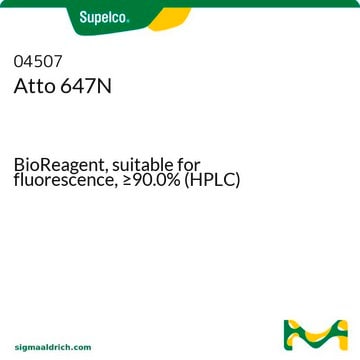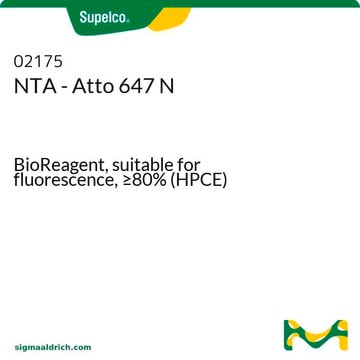42247
Atto 647N DOPE
suitable for fluorescence
Synonym(s):
1,2-Dioleoyl-sn-glycero-3-phosphoethanolamine labeled with Atto 647N
Sign Into View Organizational & Contract Pricing
All Photos(1)
About This Item
UNSPSC Code:
12352116
NACRES:
NA.32
Recommended Products
Assay
≥80.0% (HPCE)
≥90.0% (HPLC)
Quality Level
manufacturer/tradename
ATTO-TEC GmbH
λ
in chloroform/methanol
UV absorption
λ: 643.0-649.0 nm Amax
suitability
suitable for fluorescence
storage temp.
−20°C
General description
Atto 647N belongs to a new generation of fluorescent labels for the red spectral region. The dye is designed for application in the area of life science, e.g. labeling of DNA, RNA or proteins. Characteristic features of the label are strong absorption, excellent fluorescence quantum yield, high photostability, excellent ozone resistance, good solubility, and very little triplet formation. Atto 647N is a cationic dye. After coupling to a substrate the dye carries a net electrical charge of +1.
In common with most Atto-labels, absorption and fluorescence are independent of pH in the range of 2 to 11, used in typical applications. As supplied Atto 647N consists of a mixture of two isomers with practically identical absorption and fluorescence properties.
Atto-Dye Labeled Phospholipids
Sigma-Aldrich offers a variety of glycero-phospholipids carrying one or two fatty acid groups (lipophilic groups) and a phosphate ester residue (hydrophilic group). They are labeled at the hydrophilic head group. After incorporation of the phospholipid into a membrane the fluorophore is located at the water/lipid interface of the membrane. We currently provide 1,2-dipalmitoyl-sn-glycero-3-phosphoethanolamine (DPPE), 1,2-dioleoyl-sn-glycero-3-phosphoethanolamine (DOPE), palmitoyl-sn-glycero-phosphoethanolamine (PPE), and 1,2-dimyristoyl-sn-glycero-3-phospho-ethanolamine (DMPE) labeled with Atto-dyes.
find more information here
In common with most Atto-labels, absorption and fluorescence are independent of pH in the range of 2 to 11, used in typical applications. As supplied Atto 647N consists of a mixture of two isomers with practically identical absorption and fluorescence properties.
Atto-Dye Labeled Phospholipids
Sigma-Aldrich offers a variety of glycero-phospholipids carrying one or two fatty acid groups (lipophilic groups) and a phosphate ester residue (hydrophilic group). They are labeled at the hydrophilic head group. After incorporation of the phospholipid into a membrane the fluorophore is located at the water/lipid interface of the membrane. We currently provide 1,2-dipalmitoyl-sn-glycero-3-phosphoethanolamine (DPPE), 1,2-dioleoyl-sn-glycero-3-phosphoethanolamine (DOPE), palmitoyl-sn-glycero-phosphoethanolamine (PPE), and 1,2-dimyristoyl-sn-glycero-3-phospho-ethanolamine (DMPE) labeled with Atto-dyes.
find more information here
Legal Information
This product is for Research use only. In case of intended commercialization, please contact the IP-holder (ATTO-TEC GmbH, Germany) for licensing.
Storage Class Code
11 - Combustible Solids
WGK
WGK 3
Flash Point(F)
Not applicable
Flash Point(C)
Not applicable
Certificates of Analysis (COA)
Search for Certificates of Analysis (COA) by entering the products Lot/Batch Number. Lot and Batch Numbers can be found on a product’s label following the words ‘Lot’ or ‘Batch’.
Already Own This Product?
Find documentation for the products that you have recently purchased in the Document Library.
Customers Also Viewed
Nanoscale organization of nicotinic aceylcholine receptors by stimulated emission depletion microscopy.
Kellner, R.R., et al.
Neuroscience, 144(1), 135-143 (2007)
Direct observation of the nanoscale dynamics of membrane lipids in a living cell. Nature.
Eggeling, C.; et al.
Nature, 457, 1159-1162 (2009)
Fluorescence lifetime imaging with pulsed diode laser enabled stimulated emission.
Ge, J.; Kuang, C.; Lee, SS.; Kao, FJ
Optics Express, 20(27), 28216-28216 (2012)
Fluoreszierende Rhodamine und fluorogene Carbopyronine fur die STED-Mikroskopie lebender Zellen.
Butkevich, Alexey N.; et al.
Angewandte Chemie (International Edition in English), 128(10), 3350-3355 (2016)
Analysis of replication factories in human cells by super-resolution light microscopy.
Cseresnyes, Z.; et al.
BMC Cell Biology, 10(1), 88-88 (2009)
Our team of scientists has experience in all areas of research including Life Science, Material Science, Chemical Synthesis, Chromatography, Analytical and many others.
Contact Technical Service





